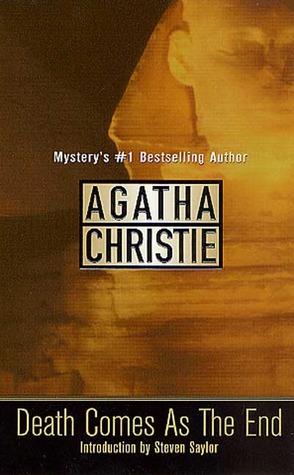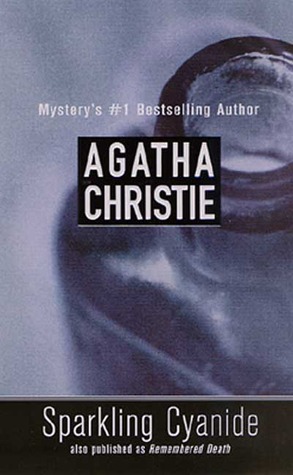I've gone back and forth on what to call these books. Sometimes I call them Stand Alones sometimes I go with Non-Series. Whatever I call them I mean the 20 or so books that Agatha wrote that don't have a reoccurring main character like Hercule Poirot. These are the books she wrote that were published in the 1940s. To be honest two of these aren't some of my favorites. I don't know if the fact the world was at war and her home had been taken over by soldiers who were using it as a base affected her writing or if her interests from that time period and mine just don't line up. Something I've always found interesting is that a solider who happened to be an artist painted an elaborate mural in one of the rooms. When the war was over the Army offered to restore the room to its original un-muraled state and she declined. You can still see that mural if you tour Greenway.
Towards Zero (1944)
I have really mixed feelings about Towards Zero. On the surface I like it. The characters are interesting and the basic premise is good. Somehow it feels a little forced though, like her publisher told her she needed to put a certain number of twists and turns in the story and she did even though that's not really what she wanted to do. After a dinner party Mr. Treves, an elderly lawyer with a heart condition, succumbs to a heart attack. No one thinks too much about it until Lady Tressilian is found bludgeoned to death in her bed. A chance remark made by Mr. Treves about knowing a murder sparks an investigation into a link between the deaths. The house is rife with tension as Lady Tressilian's God son Nevile Strange is staying there along with his wife Kay and his ex-wife Audrey. We also see Superintendent Battle which is always nice. There's a lot that gets wrapped up in the last 50 pages. Overall, this isn't bad but isn't one I would recommend starting with if you haven't read Agatha 3 Stars
Death Comes at the End (1945)
This is completely different than any of Agatha's other books. She has a few other books that take place in the past (Murder in Retrospect comes to mind) but this one really takes place in the past with the setting being Ancient Egypt. Her husband was a fairly renowned archaeologist so many of her books are set in the Middle East so this setting isn't completely shocking. Also, I have to wonder if the war going on around her made her want to focus on a different time period. This is also not one of my favorites though it's definitely an interesting book. The setting is the home of a wealthy man and his adult children and their family. His daughter, Renisenb, has come home after the death of her husband. There is a power struggle between the father, Imhotep, and his adult sons Yahmose and Sobek. The tension is not helped when Imhotep introduces his new concubine, Nofret, who seems to delight in making tense situations worse. It's not a surprise when she ends up dead. While this isn't one of my favorite stories her ability to change her writing style is really impressive. The entire story has an almost sing song quality and the whole rhythm of speaking is entirely different. She does manage to work in some classic Agatha twists and turns and it ends up being a pretty solid mystery. 3 Stars
Sparkling Cyanide (or Remembered Death) (1945)
With Sparkling Cyanide we're back to Agatha at her classic Agatha best. The beautiful glamorous Rosemary has been dead for almost a year when we meet her younger sister Iris. Rosemary's former husband is concerned that Rosemary's suicide may have something more and is determined to figure out what really happened. Iris discovers a letter that indicates that one of Rosemary's many flirtations may have been much more. We also get to visit with Colonel Race again which I always enjoy. The red herrings are well done and I really thought the murderer was someone else until almost the end of the book. I liked the play on the locked room since both murders take place at a table in a nightclub with multiple witnesses swearing no one else approached the table.
4 Stars
Crooked House (1949)
When millionaire Aristide Leonides is murdered the pool of supsects is very small. Only the people in the house could have swapped out the bottle of insulin for the fatal bottle of eyedrops. Charles Heyward, the son of the assistant commissioner of Scotland Yard, Sir Arthur Heyward, is tasked with helping the police with the investigation. Charles just happens to be unofficially engaged to Sophia Leonides who refuses to let it become official until her grandfather's murder is solved. We meet the aged sister of Aristide's first wife who has raised the children and hates the 2nd wife. Brenda, wife number 2, is 50 years younger and seems to be in love with the tutor. One of Aristide's son's has run his business into the ground, the other has a wife that is constantly wanting to sink vast sums of money into theatrical productions. The two children are always around and always listening to things they shouldn't. In several interviews and in her autobiography Agatha listed this as her favorite of her books. It's definitely a good one - uniquely and beautifully plotted with vividly drawn characters. 5 Stars




Have you read any of her books written under the pseudonym Mary Westmacott? I had a collection of her romance novels at one time, but never made it very far in. I can't remember why. Disinterest or lack of time. I am not sure what happened to that collection, sad to say. Maybe I still have it somewhere. I will have to look when I get home.
ReplyDeleteIt's funny you should mention Westmacott. I was just thinking about those books and how I should look for them. I read a couple when I was a teenager and didn't love them but I want to give them a retry as an adult. I think I've got one in a box somewhere. I'm definitely going to have to find it for a reread.
DeleteI have read and loved Crooked House, but for some reason never read the others. I adore Christie and after reading your thoughts will add Sparking Cyanide. Thanks for sharing these and your thoughts Katherine.
ReplyDeleteI like Sparkling Cyanide a lot. It's definitely a unique mystery setup. I love Crooked House. I don't think it gets nearly the recognition it deserves!
DeleteI read Agatha Christie books years ago as a teenager and young adult. I thought I had read nearly all of her books, but I don't Death Comes As the End at all. I only have vague memories of the others. I guess I should re-read some of them! I like your comments about the books, Katherine.
ReplyDeleteThanks! Death Comes As the End is incredibly different. Not just in the setting but the writing style as well. It's definitely worth going back and reading.
DeleteThis was interesting, thanks. I'm just starting Christie and will use this a guide.
ReplyDeleteI've got the links to the past Christie reviews under favorites. My original plan was to read all her books in a year but realistically that's probably not going to happen when you throw in review books and just other books I decide I want to read. I'm still planning on getting them all read but it may be a 2 year goal versus a 1 year!
DeleteI've only read one Agatha Christie novel (And Then There Were None) but plan to read more. Will keep these titles in mind...
ReplyDeleteI love Agatha but I'll forgive you for only reading one! The last 2 are definitely some good ones though there's so many to pick and choose from. Especially in the 30s/40s/50s.
DeleteGood reviews, and I like how you grouped these together in a single post. I've always rather liked Towards Zero - perhaps because I saw it as a play first. And it's one of the few Superintendent Battle books. I like Battle, although he's always quite the secondary character. For some reason I always mis-remember Sparkling Cyanide as a Poirot. Either there's a Poirot novel or short story with a very similar plot, or maybe they filmed it as a Poirot at some point? Crooked House is really well done, but the ending shocked me the first time I read it (in high school, as I recall.) Anyway, it's clear that I have some rereading to do!
ReplyDeleteI've always liked Towards Zero too but this reread it left me a little dissatisfied. Though it is one of Battle's best. Have you read any Patricia Wentworth? She has a rather Battle-like detective. I completely agree about the Sparkling Cyanide/Poirot confusion. I was surprised when I got to Sparkling Cyanide because I thought it was a Poirot book. Murder in Retrospect has kind of a similar plot so maybe that's it? I'll have to be on definitely a little shocking. It kind of surpristhe look out for the similar book though. The Crooked House ending is es me every time I read it!
DeleteI've been a huge Agatha Christie fan for as long as I can remember. Her books were some of my favorite Christmas presents as a kid. When I started blogging I decided to go back and read them in order, you saw the review I did for the most recent. Some of my favorite books are the stand al ones. And Then There Were None is my favorite of all time. I also love The Man in the Brown Suit. Thanks for coming by earlier. I'm going to enjoy your reviews.
ReplyDeleteAnd Then There Were None is high up on my favorites as well though I think Sleeping Murder tops it. The Man in the Brown Suit is fantastic and very under-appreciated in my opinion! Love that you see a hint of the Roger Ackroyd twist in that one!
DeleteI love Agatha Christie, I must have read all her books as a teenager ! Have you ever tried those she wrote under the name of Mary Westmacott ? I read one, Absent in the spring, that left me a lasting memory ;)
ReplyDeleteI read Death Comes As The End years ago and enjoyed it, probably partly due to my fondness for Ancient Egypt. However, I only recently released that it was by Agatha Christie when I discovered it with a gorgeous Fontana cover! Come, Tell Me How You Live gives a nice snapshot of Agatha Christie's archaeological work with her husband in the Middle East.
ReplyDelete